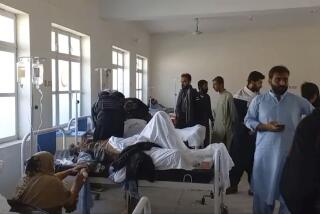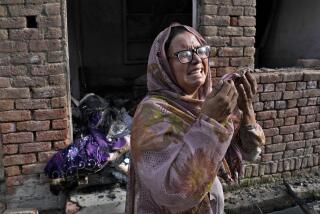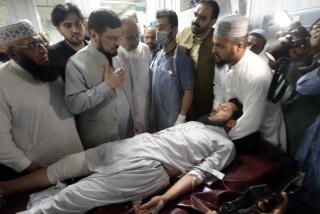9 slain in attack on Shiite prayer hall in Pakistan
- Share via
PESHAWAR, PAKISTAN — Nine people were killed and at least 25 wounded Thursday night when a teenage suicide bomber blew himself up in a crowded Shiite Muslim prayer hall in this border region.
The attack marked the onset of sectarian violence that often flares in Pakistan during Ashura, the annual religious holiday when Shiites mourn the death of Imam Hussein, a grandson of the prophet Muhammad. Shiites are a minority in Pakistan.
Elsewhere in the troubled mountain region near the border with Afghanistan, dozens of Pakistani paramilitary troops abandoned an outpost after receiving threats from Islamic militants.
A day earlier, rebel fighters overran a nearby fort and military officials Thursday were searching for 15 soldiers.
Within an hour of the suicide bombing, Peshawar Mayor Haji Ghulam Ali confirmed that nine people had been killed, including a police officer.
Several of the worshipers who gathered at Lady Reading Hospital, where the wounded were treated, said they saw a youth in a traditional shalwar kameez, a long tunic over loose pants, force his way into the prayer hall. He fired three shots and detonated his explosives when worshipers tried to overpower him.
“I was present outside the compound of the worship hall and the sermon by the head cleric was in progress when the explosion took place inside the premises,” Jaffar Abbas said.
Authorities said the bomber possibly was as young as 16.
Witnesses said the scene at the hall was chaotic after the blast, with blood and body parts on the floor. The injured included two female police officers posted in an effort to boost security during the holiday.
Pakistan has been troubled by sectarian violence since the 1980s, with the emergence of Sunni and Shiite militant groups that have waged a bloody war of bomb attacks and assassinations, particularly during the religious holiday.
“The Shiite are hunted by military groups of those who want Pakistan to become a Sunni state and this is the preferred time to kill them,” said C. Christine Fair, an analyst for Rand Corp. who specializes in South Asian affairs.
She said the trend among militants was toward younger suicide bombers.
“These attacks aren’t as sophisticated as people think,” she said. “Successful bombers don’t need an exit strategy. There’s no danger of being interrogated. It’s better than a gun.”
Meanwhile, officials acknowledged that paramilitary troops had abandoned a roadside outpost Thursday without a fight after Islamic militants warned them to vacate or face attack.
On Wednesday, Muslim rebel fighters overran the nearby Sararogha Fort in a battle that left seven soldiers dead and 15 troops missing.
The rout was seen as an embarrassment to the U.S.-allied government of President Pervez Musharraf, raising questions about his military’s control of the volatile region.
In another incident, militants fired rockets at a nearby helipad. Officials said that three Cobra helicopters were parked there, but the rockets missed their target.
Fair, the analyst, said many of the paramilitary troops were local conscripts who have tribal allegiances to militants and have allowed Taliban fighters to cross over from Afghanistan.
“Many of them are unwilling to fight and have surrendered en masse,” she said.
Pakistani military officials have been forced to rely on the paramilitary forces because regular troops, mostly young men from the distant province of Punjab, are seen as outsiders in the lawless mountain region governed by tribal chiefs, most of whom are Pashtun.
“The army is demoralized,” she said. “In the mountain regions of Pakistan, they’re seen as much as outsiders as we are.”
--
Special correspondent Ali reported from Peshawar and Times staff writer Glionna from Islamabad, Pakistan.
More to Read
Sign up for Essential California
The most important California stories and recommendations in your inbox every morning.
You may occasionally receive promotional content from the Los Angeles Times.














